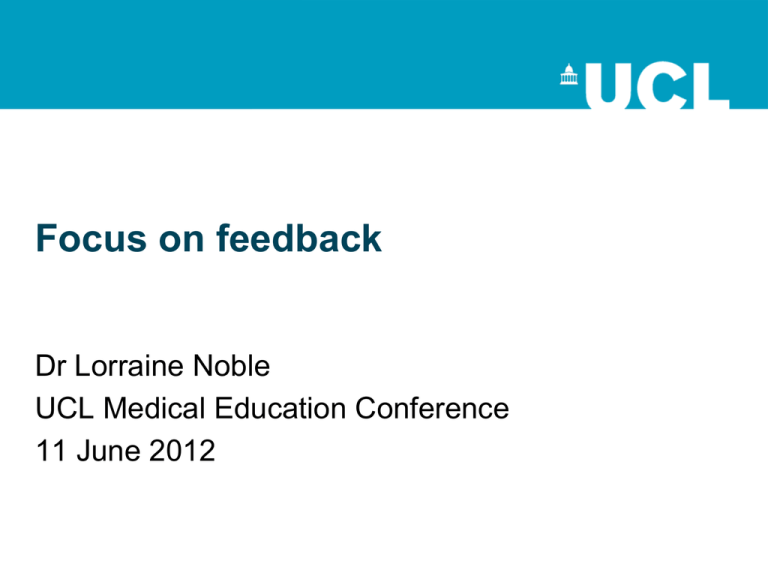Focus on feedback Dr Lorraine Noble UCL Medical Education Conference 11 June 2012
advertisement

Focus on feedback Dr Lorraine Noble UCL Medical Education Conference 11 June 2012 Workshop objectives By the end of this workshop, you should be able to: • Identify features of effective feedback on consultation skills • Describe the consultation skills in which undergraduates are expected to develop proficiency • Consider different approaches to feedback for use in different situations • Select video resources for use in consultation skills training ‘Rules for effective and acceptable feedback’ Content of feedback • Focus on specific behaviours and events in the consultation (such as an interruption by the doctor) rather than making general statements (e.g. ‘You never allow the patient to talk’) • Limited to behaviours that can be modified, rather than comments on personality (such as ‘You are domineering’). • Limit the number of comments to those that can be used by the learner – avoid the temptation to overload with every observation Schofield T (1984) in Pendleton D & Hasler J. Doctor-patient communication. London: Academic Press. pp 266-68 ‘Pendleton’s rules’ Process of feedback • “After the consultation has been observed, the doctor concerned should be allowed to make the first comments about the consultation and his strengths and weaknesses. • The teacher should first comment on the strengths of the consultation, the tasks that have been achieved and the skills and strategies that were effective in doing so. • Negative comments about tasks which have been less well achieved should always be coupled with constructive comment about skills and strategies that may be more helpful or effective.” Schofield T (1984) in Pendleton D & Hasler J. Doctor-patient communication. London: Academic Press. p 268 Working list to use in a session Before the consultation • Agree tasks to be achieved in the consultation After the consultation • Which tasks were achieved? Strengths: Skills and strategies observed to be helpful • Which tasks were not achieved? Areas to improve: Skills and strategies which may be helpful Note: several tasks can be included for a single consultation, e.g. build rapport with an anxious patient, establish whether the condition requires urgent treatment, enable the patient to make an informed decision Video resource www.cetl.org.uk/learning/feedback_opportunities/player.html Consultation skills for undergraduates PROFESSIONALISM ETHICAL & LEGAL PROCEDURES EORY & TH SP E C FO S T RE CO EVIDENCE BASED PRACTICE OFESSION RA-PR AL INT R-PROFESSIONAL INTE Presentation OTHE EV IDENCE R R MEDIA MM UNI C AT I IE PAT NG BEYOND THE NT REFLECTIVE PRACTICE UK Core Curriculum in Communication Skills Von Fragstein et al. (2008) UK consensus statement on the content of communication curricula in undergraduate medical education Medical Education, 42, 1100-07. The Calgary-Cambridge Guide to the Medical Interview Initiating the consultation Providing structure making making organisation organisation overt overt attending to attending to flow flow preparation establishing initial rapport identifying the reasons for the consultation Gathering information exploration of the patient’s problems to discover the: biomedical perspective patient’s perspective background information - context Physical examination Explanation and planning achieving a shared understanding: incorporating the patient’s illness framework Building the relationship using using appropriate appropriate non-verbal non-verbal behaviour behaviour developing developing rapport rapport involving the involving patient the patient Closing the consultation ensuring appropriate point of closure forward planning www.skillscascade.com/handouts/CalgaryCambridgeGuide.pdf Video resource • E.g. Doug and Carol Old Times Part 2 www.youtube.com/watch?v=Bvvca-HX2Bs Other approaches to feedback: Interpersonal process recall (Kagan 1980) • To develop the learner’s ability to attend to their own thoughts and actions • Review of video or audio consultation • Learner or supervisor can stop the tape • Learner reports thoughts or feelings • Supervisor facilitates discovery with open-ended questions • Supervisor does not adopt a teaching style Craig Cashwell (2001) IPR: Recalling thoughts and feelings in supervision (www.cyc-net.org/cyc-online/cycol-1001-supervision.html) Video resource UK Council of Clinical Communication (2011) Essential clinical communication: key tasks of the consultation through e-learning. (www.medilectures.com/medilecturesukc.html) Further resources • Kurtz S, Silverman J & Draper J (2005) Analysing interviews and giving feedback in experiential teaching sessions. In Teaching and Learning Communication Skills in Medicine. Oxford: Radcliffe Medical Publishing. pp 109-129. • Quilligan S (2007) Communication skills teaching: the challenge of giving effective feedback. The Clinical Teacher, 4, 100-105.



